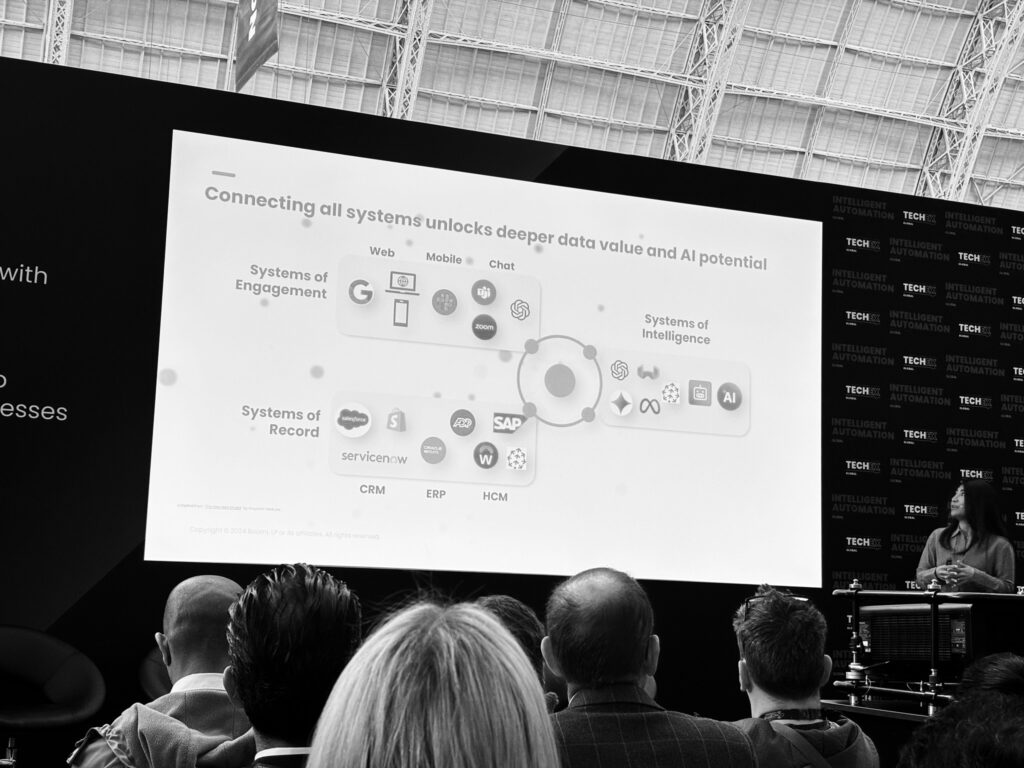By Sergio Paulino, Acuity24 Head of Development and Technology.
At the recent TechEx AI and Digital Automation conference, the spotlight was on the
transformative potential of AI and digital automation. It became evident that AI is no longer just
a tool for streamlining operations, but rather a strategic partner in shaping the future of business.
From AI-powered personalisation to new ways of monetising AI-driven products, the
conversations at TechEx were centred around how AI can truly drive value for organisations. This
blog post dives into the key insights shared at the event, exploring the shifting landscape of AI,
the importance of data governance, and the role of human-centred innovation in making AI truly
impactful.
AI As a Strategic Partner
One of the key themes was how AI is evolving beyond its traditional role. Instead of merely automating tasks or solving specific problems, AI is now seen as a strategic partner that can unlock new business models and drive long-term innovation. This shift is particularly evident in the growing trend of AI-powered personalisation with AI Agents, where companies are using AI to provide tailored experiences for customers.
The ability to turn AI into products that are monetisable, rather than just using it for support functions, is a game changer for businesses looking to scale their operations and enhance customer engagement. This evolution requires businesses to rethink how they integrate AI into their overall strategy, ensuring it aligns with long-term goals and adds measurable value.

The Role of Data Governance and Culture
While AI holds immense potential, its success is heavily dependent on the data it is trained on. A recurring topic was the importance of fostering a data-driven culture within organisations.
Without clean, well-governed data, AI solutions are likely to deliver inaccurate or suboptimal results, a risk that businesses can’t afford to take. This is why it’s crucial for organisations to prioritise data quality, transparency, and governance.
The future of AI lies in the ability to trust the data that powers these systems, and that requires creating systems that can manage and govern data effectively. Raising data literacy within teams and educating employees on the importance of data integrity is essential for ensuring that AI-driven solutions are as effective as possible.
Human-Centred Innovation in AI
Another key insight from TechEx was the need for human-centred approaches to AI development. While AI can certainly drive efficiency and innovation, it’s critical that we don’t lose sight of the human element.
AI must be designed and implemented in a way that enhances human capabilities, rather than replacing them. This means that AI solutions should be intuitive, easy to use, and focused on solving real-world problems.
The integration of AI into the workplace should also consider the impact on the workforce, ensuring that employees have the tools and knowledge they need to work alongside AI systems effectively. Human expertise will continue to be necessary for making decisions, managing risks, and interpreting AI outputs, ensuring that AI is used responsibly and ethically.
The Road Ahead: Strategic and Pragmatic Deployment
As AI continues to evolve, it’s important to approach its implementation with both strategy and pragmatism. While the hype around AI is undeniable, it’s essential for businesses to focus on use cases that will provide tangible benefits in the short and long term.
This means prioritising AI solutions that solve specific challenges and provide measurable results. The road ahead will require organisations to balance innovation with responsible deployment, ensuring that AI is used to enhance operations, improve customer experiences, and drive business growth.
AI agents, automation, and data-driven solutions are all key pieces of this puzzle, but success will come from a well-thought-out strategy that aligns AI with the organisation’s broader objectives.

How Acuity24 Can Help:
At Acuity24, we have hands-on experience implementing AI across real-world business scenarios, helping organisations turn AI potential into tangible results. We’ve worked with multiple AI platforms to automate documentation, enhance financial analysis and discussions, and streamline the collection of data from unstructured templates. In addition, we’ve successfully applied AI within Sage, improving customer communications and interactions.
Our expertise lies in leveraging AI to drive efficiency and unlock new opportunities while ensuring that businesses adopt a strategic, value-driven approach. Whether you’re looking to automate processes, improve decision-making, or enhance customer engagement, we can help you navigate AI adoption with practical, results-focused solutions.
The potential of AI and digital automation is vast, and the insights shared have only scratched the surface. As businesses continue to explore AI’s role in their operations, it’s clear that the journey is just beginning. The key to success will be adopting a strategic, data-driven approach while keeping the human element at the forefront of AI innovation. In the coming weeks, I’ll be diving deeper into these insights and exploring practical ways that businesses can implement AI successfully.
Stay tuned for more detailed discussions on how to unlock the true value of AI in your organisation.
You might also like:
View More Articles & Resources
View our new Sage Intacct content and free training videos, so you can get the most from your solution.